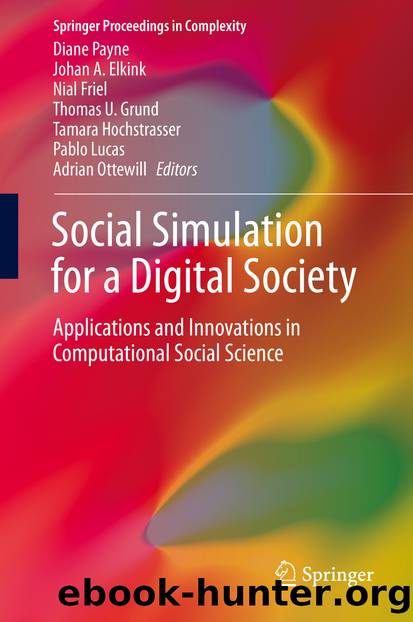Social Simulation for a Digital Society by Unknown

Author:Unknown
Language: eng
Format: epub
ISBN: 9783030302986
Publisher: Springer International Publishing
Towards a Fair SPP
What if we provided STATE_MAL with a specific rationality that would lead it to adopt the behavior that maximizes global satisfaction (i.e., 4 for the state of SUPPORT) instead of being half-way between this behavior and the Nash equilibrium? In this case, satisfactions of PROINPA and POTATO_PROD increase a little, from 61 to 72 and 35 to 46 respectively, but MONOPOLY still dominates (its satisfaction remains 87).
SocLab offers the possibility to consider “altruistic” actors that are more or less committed in the good working of the whole organizational system and so try more or less to improve not only their own satisfaction, but also the one of all other actors. Altruism can be set between 0 and 1: in case of altruism 0, the default value, the actor worries only about its own satisfaction; in case of altruism 1, it considers only the satisfactions of others (i.e. global satisfaction minus its own). If the STATE_MAL’s altruism rises up to 1, simulation results show that the satisfactions of PROINPA and POTATO_PROD increase until 71 and 53 respectively, while the one of STATE_MAL decreases from 54 to 33, and the satisfactions of the two other actors do not significantly change. However, the levels of resources PREBASIC_S, CERTIFIED_S and POTATOES vary very slightly, and the MONOPOLY is still the more satisfied actor, i.e., the system does not move towards higher satisfaction for consumers, a fair SPP.
It seems that the way towards a fairer SPP requires changes in the SPP structure, not just in the actors’ behaviors. Assume that the Venezuelan State is in capacity to adopt energetic measures to prevent and repress speculations on the potato market. This gives rise, in the model, to reversing the effect function of the MANIPUL_M resource on the MONOPOLY actor as a linear decreasing function, since speculation becomes very costly for traders. Assume also that the STATE_MAL actor is more concerned by the well-operating of the SPP and behaves with altruism of 0.5. Simulation results provide the configuration shown in the last column (at the right) of Table 8.2, which is much fairer than the configuration shown in the first row of this table. The configuration of such a fairer SPP features a higher global satisfaction (337) than the maximal global satisfaction got in the SPP (318). The MONOPOLY, that should be renamed WHOLESALERS, is still the most satisfied actor. This is a very common situation in agricultural markets, especially in developing economies where the small number of intermediaries vis-à-vis many small producers provides the former with advantages in price negotiations.
Download
This site does not store any files on its server. We only index and link to content provided by other sites. Please contact the content providers to delete copyright contents if any and email us, we'll remove relevant links or contents immediately.
Kotlin in Action by Dmitry Jemerov(19348)
Grails in Action by Glen Smith Peter Ledbrook(16801)
Sass and Compass in Action by Wynn Netherland Nathan Weizenbaum Chris Eppstein Brandon Mathis(14284)
Configuring Windows Server Hybrid Advanced Services Exam Ref AZ-801 by Chris Gill(7520)
Azure Containers Explained by Wesley Haakman & Richard Hooper(7514)
Running Windows Containers on AWS by Marcio Morales(7066)
Microsoft 365 Identity and Services Exam Guide MS-100 by Aaron Guilmette(5451)
Microsoft Cybersecurity Architect Exam Ref SC-100 by Dwayne Natwick(5291)
Combating Crime on the Dark Web by Nearchos Nearchou(5044)
The Ruby Workshop by Akshat Paul Peter Philips Dániel Szabó and Cheyne Wallace(4720)
Management Strategies for the Cloud Revolution: How Cloud Computing Is Transforming Business and Why You Can't Afford to Be Left Behind by Charles Babcock(4563)
Python for Security and Networking - Third Edition by José Manuel Ortega(4296)
The Age of Surveillance Capitalism by Shoshana Zuboff(4274)
Learn Windows PowerShell in a Month of Lunches by Don Jones(4192)
Learn Wireshark by Lisa Bock(4192)
Ember.js in Action by Joachim Haagen Skeie(4074)
The Ultimate Docker Container Book by Schenker Gabriel N.;(3938)
DevSecOps in Practice with VMware Tanzu by Parth Pandit & Robert Hardt(3627)
Windows Ransomware Detection and Protection by Marius Sandbu(3599)
